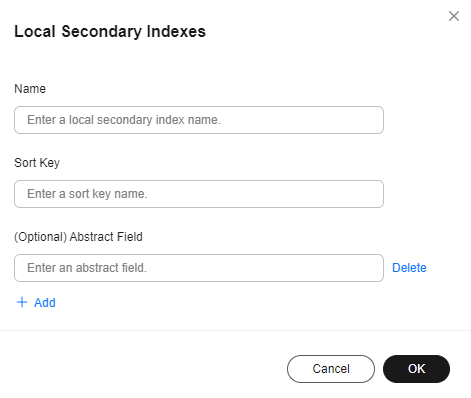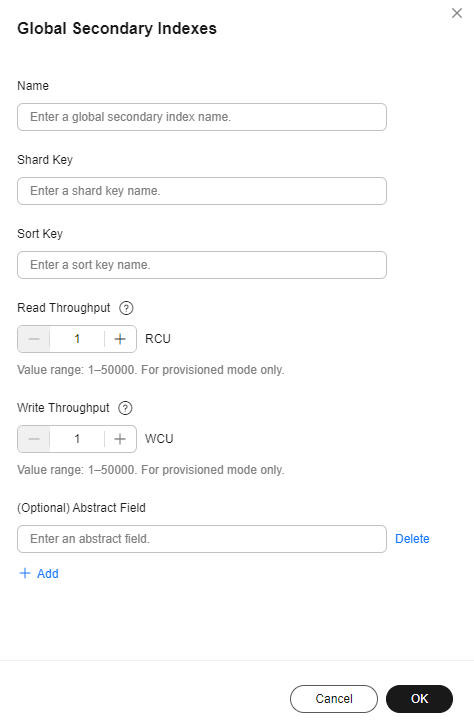Creating Indexes
Scenarios
You will create indexes for a table.
Prerequisites
The table you want to create indexes for has been created.
Notes and Constraints
- A maximum of five local secondary indexes and 20 global secondary indexes can be created for a table.
- Indexes can only be created during table creation.
- Duplicate composite primary keys (shard key and sort key) are not allowed for multiple global secondary indexes of a table.
- Duplicate keys are not allowed in a single global secondary index.
- A global secondary index cannot have the same shard key as its base table.
- Duplicate sort keys are not allowed for multiple local secondary indexes of a table.
- Duplicate keys are not allowed in a single local secondary index.
- A local secondary index cannot have the same shard key as its base table.
- A local secondary index cannot have the same sort key as its base table.
Procedure
- Log in to the KVS console.
- In the navigation pane, choose Stores.
- Search for and select a store where you want to create indexes and click Create Table in the Operation column. Or you can click the store name to go to its details page and click Create Table.
- Select a billing mode, enter table details, and configure the provisioned read and write throughput (only required for the provisioned billing mode).
- In the Secondary Index area, create secondary indexes. KVS allows you to create local and global secondary indexes.
- Click Create Local Secondary Index and configure parameters as instructed in Table 1. Confirm the configuration and click OK.
Figure 1 Local Secondary Indexes

Table 1 Local secondary index parameters Type
Parameter
Description
Create Local Secondary Index
Name
Mandatory
The name of a local secondary index. It must be 1 to 255 characters long. Numbers (0–9), letters (a–z and A–Z), hyphens (-), underscores (_), and periods (.) are allowed. An index name cannot be XPriIndex.
Sort Key
Mandatory
A sort key must be 1 to 63 characters long and cannot start with an underscore (_). Numbers (0–9), letters (a–z and A–Z), hyphens (-), and underscores (_) are allowed.
Abstract Field
Optional
An abstract field in the local secondary index. You can create multiple abstract fields in an index. An abstract field must be 1 to 63 characters long and cannot start with an underscore (_). Numbers (0–9), letters (a–z and A–Z), hyphens (-), and underscores (_) are allowed.
- Click Create Global Secondary Index and configure parameters as instructed in Table 2. Confirm the configuration and click OK.
Figure 2 Global Secondary Indexes

Table 2 Global secondary index parameters Type
Parameter
Description
Create Global Secondary Index
Name
Mandatory
The name of a global secondary index. It must be 1 to 255 characters long. Numbers (0–9), letters (a–z and A–Z), hyphens (-), underscores (_), and periods (.) are allowed. An index name cannot be XPriIndex.
Shard Key
Mandatory
A shard key must be 1 to 63 characters long and cannot start with an underscore (_). Numbers (0–9), letters (a–z and A–Z), hyphens (-), and underscores (_) are allowed.
Sort Key
Optional
A sort key must be 1 to 63 characters long and cannot start with an underscore (_). Numbers (0–9), letters (a–z and A–Z), hyphens (-), and underscores (_) are allowed.
Read Throughput
Value range: 1 to 50000 (unit: RCU) This field is only valid in the provisioned billing mode.
Write Throughput
Value range: 1 to 50000 (unit: WCU) This field is only valid in the provisioned billing mode.
Abstract Field
Optional
An abstract field in the global secondary index. You can create multiple abstract fields in an index. An abstract field must be 1 to 63 characters long and cannot start with an underscore (_). Numbers (0–9), letters (a–z and A–Z), hyphens (-), and underscores (_) are allowed.
- Click Create Local Secondary Index and configure parameters as instructed in Table 1. Confirm the configuration and click OK.
- Confirm the configuration and click OK.
Feedback
Was this page helpful?
Provide feedbackThank you very much for your feedback. We will continue working to improve the documentation.See the reply and handling status in My Cloud VOC.
For any further questions, feel free to contact us through the chatbot.
Chatbot





